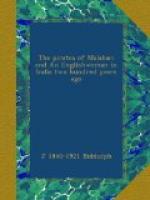“These pirates spare
none but take all they meet, and take the Europe
men into their own ships,
with such goods as they like, and sink the
ships, sending the lascars
on rafts to find the shore.”
So bold were the marauders that they cruised in sight of Bombay harbour, and careened their ships in sight of factories along the coast.
To avenge their losses, the Muscat Arabs, in April, 1697, seized the London, belonging to Mr. Affleck, a private merchant. The Arabs were engaged in hostilities with the Portuguese at the time, and forced the crew of the London to fight for them. Those who were unwilling were lashed to masts exposed to Portuguese fire, from which they did not escape scatheless. In vain the commanders of two of the Company’s vessels assured the Imaum that the London was not a pirate.
“You have sent me a letter,” he wrote, “about my people taking one of your ships. It is true that I have done so, in return for one you English took from me, so now we are even and have ship for ship; for this one I will not surrender. If you wish to be friends, I am willing to be so; if not, I will fight you and take all the ships I can.”
One pirate ship was reported to have chased two Cong ships, capturing one and forcing the other ashore, where it became a total wreck. “What influence this may have on the Rt. Hon. Company’s affairs, God alone knows,” wrote the Surat President, mournfully. Soon he was in better spirits. The same pirates had landed and plundered Cong; but, allowing themselves to be surprised, fifty-six of the crew had been set upon and killed.
With few exceptions, the English pirates came from the American colonies. Every year, from New York, Boston, Jamaica, and the Bahamas, ships were fitted out, nominally for the slave trade, though it was no secret that they were intended for piracy in the Eastern seas. Whatever compunction might be felt at attacking European ships, there was none about plundering Asiatic merchants, where great booty was to be gained with little risk. Sometimes the Governors were in league with the pirates, who paid them to wink at their doings. Those who were more honest had insufficient power to check the evil practices that were leniently, if not favourably, regarded by the colonial community, while their time was fully occupied in combating the factious opposition of the colonial legislatures, and in protective measures against the French and Indians. The English Government, absorbed in the French war, had no ships in the Indian seas; but the straits to which English trade in the East had been reduced, and the enormous losses caused by the pirates, at last forced some measures to be adopted for coping with the evil that had assumed such gigantic proportions.
[1] It appears likely that this was the John Steel
mentioned by Drury as
his uncle in Bengal.
There is very little doubt that much of Drury’s
alleged slavery in Madagascar
was spent among the pirates.




